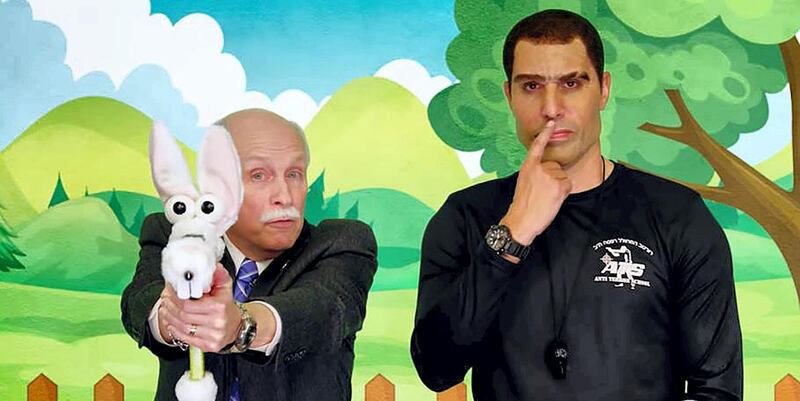“You want me to say on television that I support three and four-year-olds with firearms? Is that what you're asking me to do?” So spoke a Republican senator being interviewed by a supposed anti-terror expert, who was astonished he could be deemed foolish enough to answer. Unfortunately, other US politicians have been rather more credulous.
“I support the Kinder Guardians programme,” said the former senator Trent Lott in the very next scene, endorsing a fictional programme that claimed to train children as young as four how to use guns. Mr Lott, who spent 40 years in the US Congress, joins a rogue's gallery that includes senior and former Republican politicians duped into endorsing the outrageous programme.
All of them were tricked by the British comedian Sacha Baron Cohen on his new show Who is America?, reprising his tried-and-tested formula of posing in disguise to dupe the unsuspecting into saying outrageous things.
The first scalp of the new series has already been claimed. Republican and Georgia state lawmaker Jason Spencer was persuaded by Baron Cohen to expose himself and use a selfie stick to take photos under the burqa of a woman dressed as a Muslim (all while doing a horrendously racist impression of a Chinese tourist). Within two days of the show airing, he resigned.
Yet the response to the series from some quarters, which is still airing on American TV, has been puzzling, blaming the comedian for setting up the politicians, rather than castigating the (mostly seasoned and experienced) politicians for expressing astonishing and abhorrent opinions.
The main criticism of Baron Cohen's techniques revolves around the idea that he is bullying participants, tricking them and then showing them in the wrong light.
It is certainly true that his characters are often boorish and in the past, the comedian has displayed great insensitivity towards minority communities. Too often, particularly with his most famous creation Borat, an objectionable Kazakh journalist, he was willing to trample over the sensitivities of an entire country – in that case Kazakhstan – simply because he was insulated by the power of Hollywood.
Yet in those cases, the people he tricked were ordinary people. This time, those in the frame are elected officials or those seeking political influence. (So far, he does seem to have focused on Republicans.) They are people who actively seek to persuade the public that they know more than they do and that their judgement ought to be trusted.
It is right, then, that when their judgement is revealed to be so fundamentally flawed or questionable, they ought to face public embarrassment.
It's easy to think that those pranked got what they deserved; that Mr Spencer, a politician in a state that is more than 30 per cent African-American, thought it acceptable to run around shouting racist expletives on television suggests he is unsuitable for high office – or any office.
Yet the show also highlights how ignorant many of those proposing the most controversial policies really are. Mr Spencer had called for a “burqa ban”, yet clearly had only the dimmest understanding of one of the world's major faiths.
When George W Bush's former vice president Dick Cheney, another politician pranked by Baron Cohen, was asked to pick his favourite war, he made it seem like a game. The thousands of US personnel who came back from America's foreign wars maimed and mentally scarred – and the families of those who never came back at all – probably feel rather differently.
Mr Cheney's wars certainly don't feel like laughing matters in Iraq's cities, nor will waterboarding victims be impressed by his willingness to sign a waterboarding kit.
But that is the crucial aspect that critics of Baron Cohen's show have missed, perhaps deliberately. The interviewees really did say and do those things on camera.
And it is that which goes to the heart of the debate about the show. For most of those pranked are not members of the public, flustered, under pressure and unused to the scrutiny of a camera. They are high-ranking politicians, used to offering their opinions.
They did not merely nod sympathetically; they did not, as Bernie Sanders does, engage and disagree with the character's most ridiculous assertions; nor did they walk out.
Instead they stayed, agreed with the line of questioning and explained, enhanced and expanded the conversation in revealing ways.
Those whose real views have been so brutally exposed are not angry because they expressed those opinions. They are angry because they expressed their opinions in such a stark, unfiltered way, devoid of the moderating language, euphemisms and dog-whistle examples that those who operate in politics excel at. They really were saying what they believed, more honestly than they usually do.
And that, intriguingly, also highlights the downside of Baron Cohen's latest show and the reason his comedy now feels like an artefact of the past.
It has been 20 years since Baron Cohen's first character, Ali G, conducted similar interviews with British politicians and 10 years since Borat got his interviewees to say racist things. Yet today those views have gone mainstream.
They are no longer confined to the wilder fringes of American culture. America's president has openly made racist and misogynistic statements and the people who surround Donald Trump have pushed Islamophobic and anti-Semitic conspiracies.
The real message of Who Is America? is how high the bar of outrage needs to be before it even registers. There was a time when someone like Baron Cohen could have pranked politicians into saying that teachers needed to be armed to stop school shootings. Now that is a matter of serious political debate and a dozen US states have introduced proposals. The bar of outrage has had to be raised to pre-school children being armed.
The shocking thing is not merely the outrageous things politicians say behind closed doors; it is how much the public has come to accept the outrageous things they say openly.





